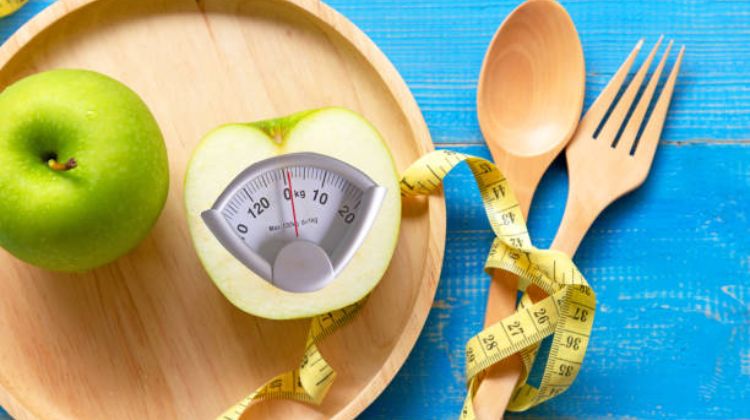| Home | Shows | Videos | Genre search | Interviews | Partners | Music | Events | Search | Chat | Blogs |

Weight loss is the desired goal for many individuals, and for some with serious health conditions, maybe a necessary one. However, the body is not designed to handle sudden drops in weight. It can be dangerous and
unsustainable. Consider how types of food, eating patterns, stress, sleep, and exercise all play a role in healthy and long-lasting weight loss.
How does Weight Loss work?
Our metabolism is how our body breaks down food (calories) into energy. Generally speaking, if the body metabolizes food faster, it helps the body lose weight, whereas a slower metabolism can cause the body to hold onto weight. Generally speaking, the fewer calories ingested, the more the body will burn fat and muscle tissue, leading to less body weight.
However, metabolism alone is not responsible for weight – the relation of food intake to physical activity makes a big difference. Even when resting, the body requires a certain amount of energy just to breathe and pump blood, so the body is still burning calories when at rest. This “resting” metabolism is known as basal metabolism[1], and a person’s age, sex, and body composition factor into it. While a person cannot control these factors, they can control how many calories they burn with exercise, as well as their stress[2] levels which, if too high, can impede weight loss.

Why Losing Weight Fast Isn’t The Best Goal?
It can be jarring and dangerous for the body to lose weight quickly, especially if the body is being overtaxed by a strict and limited diet (which can be very difficult to stick to, leading to unhealthy eating behaviors and unrealistic body image expectations). Quick attempts at weight loss can slow down how the body burns calories because the body thinks it’s starving and goes into “survival mode[3]” .This is why people tend to gain weight fast once they go back to their original diet – the body is not used to so many calories.
Engaging in intensive physical activity that is beyond your body’s capacity can tax the body, which is why it’s important to choose the exercise that gently pushes you. Additionally, with fast weight loss, muscle mass is lost in addition to fat, which can have the opposite effect of what is being strived for (we need muscles to burn calories). When it comes to weight loss, slow and steady dietary changes and exercise win the race.
The Importance Of Maintaining A Healthy Weight
Balance is key when it comes to a healthy weight. This is measured by BMI[4] (body mass index), which is your weight in relation to your height. Being overweight (having a BMI over 24.9) comes with many health risks including increased risk for diabetes, stroke, high cholesterol, heart disease, and cancer. Losing weight may help reduce these risks while also improving PCOS and other hormonal conditions, as well as asthma, reflux, and sleep problems.
Conversely, being underweight (a BMI lower than 18.5) can be problematic in that it can lead to malnutrition, vitamin deficiency, anemia, a compromised immune system, weakened bones, developmental delays (in children), and trouble conceiving.
Effective Ways To Lose Weight Fast
Physical Activity
Exercise is an essential element to any weight loss plan. Cardiovascular exercise or “cardio” (anything that gets your heart rate up steadily) is great for weight loss, including running, walking, swimming, jumping rope, and cycling, as well as strength training exercises such as lifting weights. HIIT (high intensity interval training) is another great way to incorporate movement into your weight loss plan. HIIT is quick bursts of intensive activity followed by rest periods. Yoga and pilates are also great options.
Best Diet Plans
A variety of diets can aid in weight loss, and much will depend on the person. Not everyone responds the same way to the same foods or eating patterns, and restrictive diets are not for everyone, especially in the long term. However, many diet plans have a few things in common: They limit empty calories, are low in sugar and inflammatory foods, and are primarily vegetable-based.
Modified Food Plans To Lose Weight Fast
Conventional Hypocaloric Diets (Calorie-Deficit Food Plans)
Diets that are extremely low in calories (a third of normal caloric intake[5]) are referred to as hypocaloric diets. This may mean as little as 800 calories. Their main purpose is to induce fast weight loss, though not always sustainable weight loss, and these diets are usually prescribed therapeutically for individuals whose health depends on weight loss (such as type 2 diabetes). Hypocaloric diets should be overseen by a medical professional.
Intermittent Fasting
Intermittent fasting (IF) is the practice of restricting eating to specific feeding times and alternating them with periods of fasting. Rather than restricting food itself, it restricts the time you can eat. There are many versions of IF, such as 16:8, which dictates fasting for 16 hours and eating within an eight-hour window of time. Other versions include eating normally six days a week and fasting on the seventh day.
Restricting eating to specific windows of time alone will decrease the amount of calories you take in. Additionally, IF may increase norepinephrine[6], which can speed up metabolism, while decreasing insulin levels, both of which can help weight loss efforts.
Plant-Based Diets
Any diet which is heavily plant-based can assist with weight loss. This is because vegetables have very few calories per ounce compared to other foods. For example, one cup of broccoli has roughly 30 calories, while a candy bar has 150-200 calories. This means a person can eat a ton of vegetables and still stay within a reduced calorie diet. In the meantime, whole fruits and vegetables provide numerous nutrients which help the body function optimally, having a cascading effect on weight loss.
Low Carbohydrate Diets
A low-carb diet limits carbohydrate[7] intake in their many forms – grains, starches, sugars (including those found in dairy, fruit, nuts, seeds, legumes, and especially refined flour), and instead, focuses on healthy fat and protein. When carbs are ingested, insulin is released which transports the glucose from the carbs into our cells for energy. However, eating excess carbs can cause excess glucose to end up in our fat cells. By eating a low-carb diet, the body is able to burn fat, instead of sugar, for energy and in the process, weight loss can occur.
Paleo Diet
The Paleo diet (short for Paleolithic diet) mimics how our hunter-gatherer ancestors ate thousands of years ago. It is similar to a low-carb diet in that it restricts grains, dairy, beans, and sugar. Paleo diets include protein from plants and animals, vegetables, fruits, nuts, seeds, herbs and spices, and healthy fats.
Low-Fat Diets
Decreasing the amount of fat in your diet can decrease calories, however it’s only part of the equation. The body stores excess calories as fat, so it’s important to consider how many calories you’re taking in from all sources. Losing weight happens when you burn off more calories than you consume[7].
Another thing to note is that not all fat is created equal – healthy omega-3 fats from fish, avocado, nuts, seeds, and olives can assist in weight loss, whereas trans fats (found in many processed foods) can hinder weight loss efforts. How you prepare food also makes a difference. Try steaming, boiling, or baking instead of frying.
Other Tips To Lose Weight Fast
Chew Slowly and Thoroughly
Digestion begins in the mouth! From there, food goes down the esophagus, into the stomach, the intestines, and continues on for up to 72 hours where a series of chemical reactions helps extract nutrients and remove toxins from your food.
Chewing food is a crucial first step of the digestive process, and it’s one of the few parts of the process that is mechanical (our teeth grind up the food and make it possible for everything to digest easily from there). Chewing slowly helps release enzymes in the mouth, particularly amylase in our saliva, which starts to break down carbohydrates.
When we chew our food properly (it should be the consistency of baby food before we swallow), the nutrients can be broken down correctly, allowing the body to absorb more efficiently. This can reduce the number of calories we ingest, as well as keep us fuller longer, which can prevent overeating. Finally, slow chewing activates our parasympathetic nervous system (our “rest and digest” mode), which puts our body in the calm state it needs to be in to process food. High levels of stress interfere with digestion, making it more difficult to lose weight.
Use Smaller Plates
Similar to intermittent fasting which restricts food intake to a “window of time,” limiting the size of plates will reduce calories by default. Sometimes we eat more than we should simply because we’re used to finishing whatever is on our plate, even if our plate is massive. This is a common conditioning instilled in us by our caretakers (“You can’t leave the table until you’ve finished your plate!”) By switching to smaller plates, you may find that it’s all you need to feel satiated. You can always grab another helping if you’re still hungry (listen to your hunger cues).
Increase Protein Intake
Protein is an essential macronutrient that should be a part of every meal and snack. Of the three macronutrients (protein, fat, and carbs), it is the least likely to be problematic for weight. We need protein for muscle, injury recovery, and hormone production. Many weight-loss diets suggest reducing carbs, fats, sugar, and/or processed foods, but protein should always be a part of your meals and snacks.
Drink More Water
Adequate hydration is essential for weight loss. This is especially true if you’re exercising as part of your weight loss plan. Water also fills up the stomach and can suppress appetite[9], which decreases the chances of overeating, and also serves as a replacement for weight-inducing sugary drinks. Water flushes out toxins which can inhibit weight loss and helps keep the bowels regular (another essential of weight loss). Finally, water enhances our ability to burn calories and fat.
Sleep Well
If you find yourself craving sweets and carbs after a poor night’s sleep, you’re not imagining it. When our bodies are low on energy, due to lack of sleep, we try to find quick bursts of energy in the form of unhealthy snacks. Poor sleep also leads to poor decision making, in general, leading us to choose foods that we’d otherwise avoid. Additionally, studies have linked limited sleep[10] to metabolic disorders and weight gain.
Getting deep, quality sleep on a consistent basis is foundational to any process in the body, including weight loss. Sleep is when the body assimilates and detoxifies everything we do and take in. Furthermore, if sleep is disturbed, cortisol (our stress hormone) rises significantly, which can make the body hold onto weight, particularly around the middle section.
What About Calories And Portion Control?
Reducing calories is an important factor in weight loss, and one way to reduce them is to monitor the amount of food you’re taking in. This can be a helpful tactic for people who are not ready to give up their favorite foods – they keep the food for now, but adjust the amount.
Intermittent fasting and switching to smaller plates are two ways to do this. Many portion sizes (in the U.S. especially) are considerably large, and when we’re conditioned to finish what’s on our plate, we may wind up eating more than we need to. One way to avoid this when dining out is to ask for a to-go box along with your order, and before you start to eat, put a portion of the food in the box to save it for later.
Conclusion
Whether you want to lose weight for your appearance or to improve health, there are healthy and sustainable ways to achieve it. Modifying your diet to decrease calories, while prioritizing protein are part of the equation. However, no weight loss efforts will succeed or last without other lifestyle habits like regular exercise, portion control, stress management, proper chewing, and quality sleep.

Anonymous: This escort service offers an experience that is worth every penny Dwarka Escorts Service, especially if you’re seeking someone who not only looks stunning but also makes you feel truly special.
08.12.2025DeleteEdit 0 points
Anonymous: Our escorts service is your trusted partner in finding quality companionship. Call Girls Service in Udaipur We are dedicated to offering a seamless and discreet way to connect with individuals who are committed to making your time together enjoyable and satisfying locally.
06.30.2025DeleteEdit 0 points




